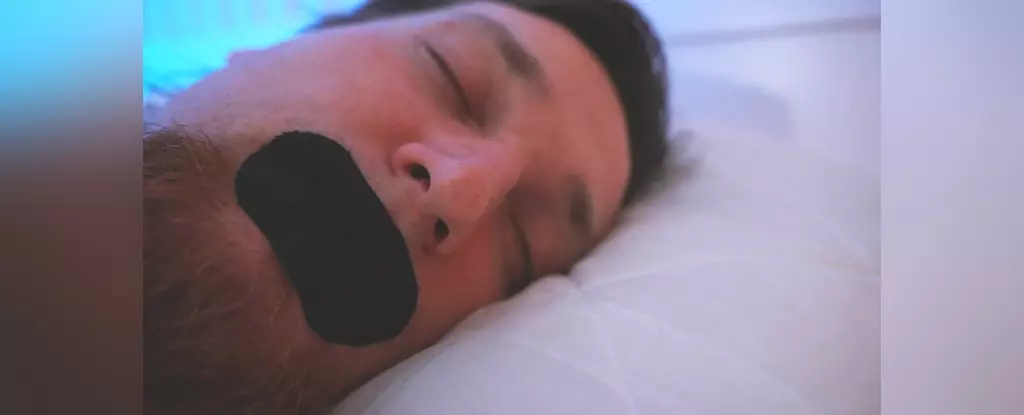For those who toss and turn at night, mouth breathing can feel like an insurmountable obstacle to obtaining quality rest. Whether it’s snoring or the more severe condition known as obstructive sleep apnea, the ramifications of poor sleep are far-reaching, not only affecting individual health but also straining relationships. In today’s age of instant solutions, many people turn to social media for quick fixes, leading them down a rabbit hole of viral trends. One particularly intriguing solution gaining traction is “mouth taping,” where a thin piece of medical tape is used to keep the mouth shut during sleep. This method, popularized by influencers, is marketed as a simple cure-all for myriad issues—ranging from energy restoration to improved jawline definition.
However, as with many trending topics, one must critically evaluate the claims made and consider the science—or lack thereof—behind these viral remedies.
The Science is Shaky
While mouth taping has garnered significant attention, the scientific foundation supporting its efficacy is tenuous at best. A review of the available literature on mouth taping reveals a troubling pattern: the studies are often poorly designed, lacking follow-up and representative samples. They investigate a limited breadth of factors, primarily addressing patients with mild sleep apnea or specific conditions without adequately considering the broader implications for those with nasal obstructions or severe sleep apnea.
Though there is some evidence suggesting mild improvements for select patients, researchers caution against applying these findings universally. They explicitly highlight the potential hazards associated with mouth taping, particularly for individuals with nasal blockages. Closing the mouth will not resolve underlying issues like sinus infections or a deviated septum. Instead, attempting to tape the mouth can obstruct airflow, posing serious health risks, including asphyxiation.
The Dangers of Band-Aid Solutions
The allure of quick fixes in health is undeniable, yet the approach of a simplistic solution often fails to address the root problem. Taping one’s mouth at night does little more than act as a band-aid, allowing individuals to sidestep genuine medical advice or treatment pathways. The implications of overlooking underlying sleep disorders can be dire, leading to prolonged struggles with sleep disruptions and a cascade of associated health problems.
The rush to embrace such practices forces individuals—already grappling with fatigue—into a cycle of temporary solutions that further complicate their health journeys. Ignoring the signs our bodies communicate, especially with something as vital as sleep, could lead down a path of avoidable health crises.
Rethinking Our Approach to Sleep
Given the misconceptions surrounding mouth taping, one must advocate a shift in focus from unproven social media trends to seeking out informed medical guidance. The first step toward improvement in sleep quality should encourage individuals to seek professional assessments rather than relying on anecdotal evidence presented through viral platforms. Consulting with healthcare providers can lead to tailored solutions such as lifestyle adjustments, alternative therapies, or even medically guided interventions that genuinely address the causes of sleep disruptions.
The pursuit of restful nights should be rooted in knowledgeable, research-backed strategies that prioritize long-term well-being over fleeting viral trends. By shifting the narrative from instant gratification to genuine health awareness, we can foster an environment wherein informed choices about our sleep become the norm rather than the exception.
Prioritize Quality Over Trends
In a world inundated with quick solutions bandied about by influencers, it is vital to underline the importance of rigorous research. While mouth taping may offer marginal benefits for certain mild cases, it is not a panacea and can indeed exacerbate more severe issues. The takeaway is clear: when it comes to health and sleep, we owe it to ourselves to embrace thorough, evidence-based practices that lead to sustainable improvement, ensuring restful nights and rejuvenated mornings devoid of the burdens of poor sleep hygiene.
Taking control of our sleep health means being discerning consumers of advice—prioritizing expertise, advocating medical evaluation, and leaning into evidence as we navigate our unique sleep challenges. The journey to restorative sleep doesn’t lie in simple hacks like mouth taping but in a commitment to informed choices that foster wellness.


Leave a Reply